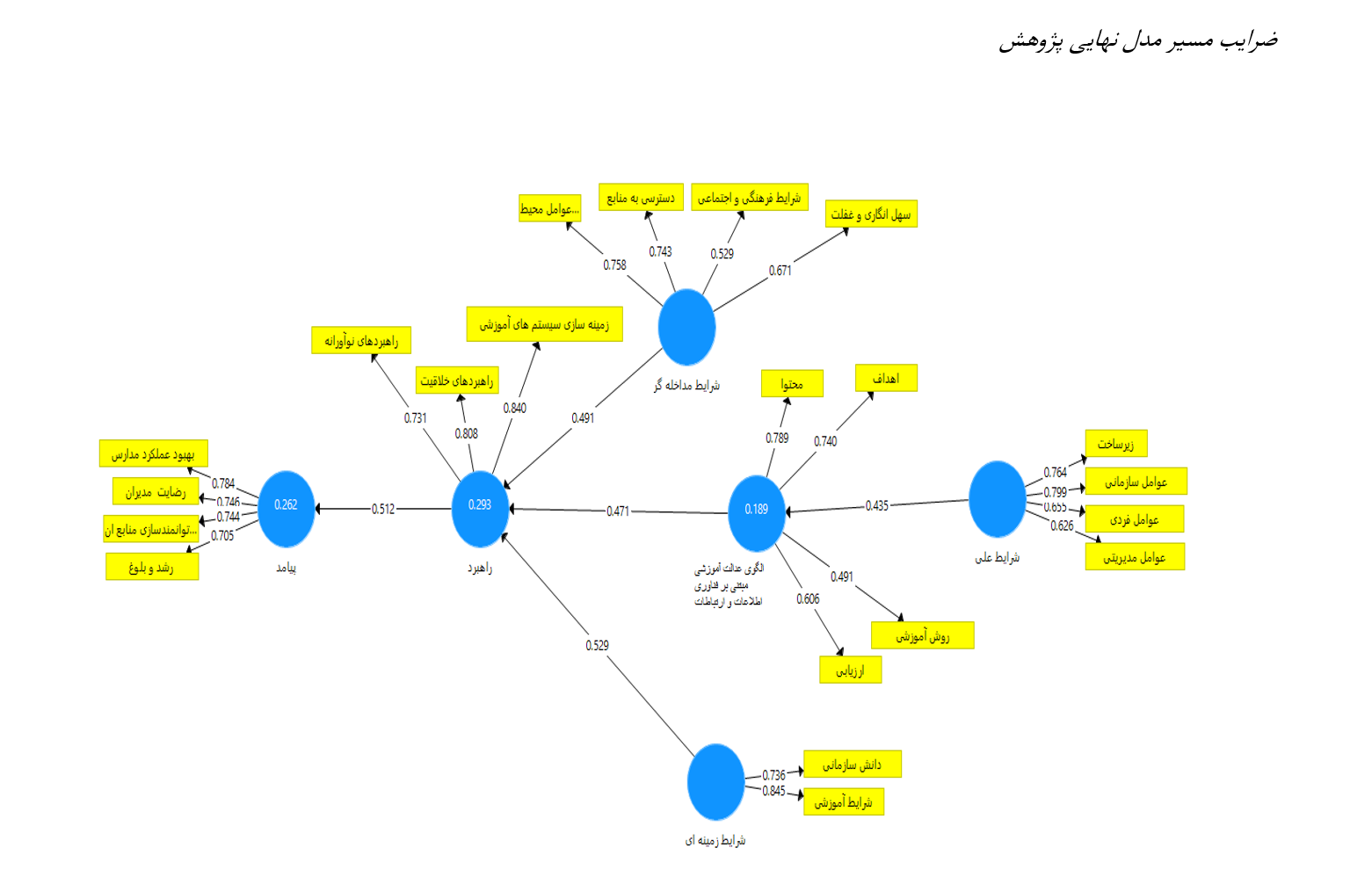ارائه و اعتبارسنجی الگوی عدالت آموزشی مبتنی بر فنآوری اطلاعات و ارتباطات با رویکرد آموزش ترکیبی در آموزش و پرورش
کلمات کلیدی:
عدالت آموزشی, فناوری اطلاعات و ارتباطات, یادگیری ترکیبی, آموزش و پرورش, مدلسازی معادلات ساختاریچکیده
هدف از این مطالعه طراحی یک الگوی عدالت آموزشی مبتنی بر فناوری اطلاعات و ارتباطات (ICT) و رویکرد یادگیری ترکیبی در آموزش و پرورش استان کرمانشاه بود. روش پژوهش ترکیبی و متوالی (کیفی-کمی) بود. در مرحله کیفی، دادهها از طریق مصاحبههای عمیق با مدیران، معاونان و اعضای هیأت علمی دانشگاههای کرمانشاه جمعآوری و با استفاده از نظریه دادهبنیاد تحلیل شدند. در مرحله کمی، پرسشنامهای بر اساس یافتههای کیفی طراحی و بین مدیران و معلمان مدارس متوسطه کرمانشاه توزیع شد. دادههای کمی با استفاده از مدلسازی معادلات ساختاری (SEM) تحلیل شدند. تحلیل کیفی نشان داد که اهداف، محتوا، روشهای آموزشی و ارزیابی به عنوان مقولههای اصلی در دستیابی به عدالت آموزشی از طریق ICT و یادگیری ترکیبی شناخته شدند. در مرحله کمی، تحلیل SEM نشان داد که شرایط علی با بار عاملی 0.435 و آماره T برابر با 9.624 تأثیر مستقیم و معنیداری بر مقوله اصلی دارد. همچنین، مقوله اصلی با بار عاملی 0.471 و آماره T برابر با 7.734 تأثیر مستقیم و معنیداری بر راهبردها داشت. راهبردها با بار عاملی 0.512 بر پیامدها تأثیرگذار بودند. شاخص KMO برابر با 0.868 بود که نشاندهنده کفایت نمونه برای تحلیل عاملی است. نتایج آزمون کولموگروف-اسمیرنوف نیز نرمال بودن دادهها را تأیید کرد. این مطالعه نشان داد که یکپارچهسازی فناوری اطلاعات و ارتباطات (ICT) و یادگیری ترکیبی در آموزش و پرورش میتواند به طور قابل توجهی به بهبود عدالت آموزشی و دسترسی به آموزش با کیفیت برای همه دانشآموزان کمک کند
دانلودها
مراجع
Ahaiuzu, B. E., Nyemezu, C. O., & Nsirim, O. (2020). Assessment of ICT Skills of LIS Educators for the Adoption of
Blended Learning in Rivers State, Nigeria. Information Impact Journal of Information and Knowledge Management,
(3), 51-62. https://doi.org/10.4314/iijikm.v11i3.6
Allayarova, S. N. (2019). Implementation of Modern Information Communication Technologies (ICT) in Higher
Education Sector: International Experience and the Example of Uzbekistan. International Journal of Innovative
Technology and Exploring Engineering, 9(1), 386-392. https://doi.org/10.35940/ijitee.a4146.119119
Anastasopoulou, E. (2024). The Impact of ICT on Education. Technium Social Sciences Journal, 58, 48-55.
https://doi.org/10.47577/tssj.v58i1.11144
Boitshwarelo, B. (2009). Exploring Blended Learning for Science Teacher Professional Development in an African
Context. The International Review of Research in Open and Distributed Learning, 10(4).
https://doi.org/10.19173/irrodl.v10i4.687
Chervonyi, P., Алєксєєва, С., Senchylo-Tatlilioglu, N., Chastnyk, O., & Diomidova, N. (2021). Peculiarities of the
Higher Education Development in a Blended Learning Environment. Revista on Line De Política E Gestão
Educacional, 2241-2257. https://doi.org/10.22633/rpge.v25i3.15959
George, G. (2024). Digital Empowerment in Education: Exploring the Dynamics and Significance of Ict – A Review.
Interantional Journal of Scientific Research in Engineering and Management, 08(01), 1-10.
https://doi.org/10.55041/ijsrem28245
Goldhaber, A. B. (2021). Impact of ICT Integration on Quality of Education Among Secondary Schools in USA. Journal
of Education, 4(6), 53-61. https://doi.org/10.53819/81018102t5015
Gumartifa, A., Larasati, F., & Aurelia, S. C. R. (2020). A Blended Learning in Ict Used for Improving English Language
Teaching. Project (Professional Journal of English Education), 3(6), 796.
https://doi.org/10.22460/project.v3i6.p796-804
Gunder, A. (2023). Centering Equity and Quality in Online, Blended, and Digital Learning. Ubiquity Proceedings.
https://doi.org/10.5334/uproc.107
Hasyim, M., & Ahmad, I. S. (2021). The Effectiveness of Implementing Blended Project Based Learning Using ICTMultimedia in Statistic Learning. https://doi.org/10.2991/assehr.k.210413.080
Ignatova, N., Kasperiūnienė, J., & Galkienė, A. (2022). Ict Scaffolding for School Education in Covid-19 Lockdown.
Society Integration Education Proceedings of the International Scientific Conference, 1, 394-403.
https://doi.org/10.17770/sie2022vol1.6873
Kotkova, V. V., & Perminova, L. (2019). Study of Kherson State University Students and Teachers' Attitudes to the
Using of Ict. Information Technologies and Learning Tools, 72(4), 194-203. https://doi.org/10.33407/itlt.v72i4.2493
Liang, M., Lim, C. P., Park, J., & Mendoza, N. B. (2022). A Review of ICT-enabled Learning for Schoolgirls in Asia
and Its Impacts on Education Equity. Educational Technology Research and Development, 71(2), 267-293.
https://doi.org/10.1007/s11423-022-10178-w
Nasrulloh, I. (2022). The Needs Analysis of Blended Learning Ipa Terpadu. icss, 1(1), 373-378.
https://doi.org/10.59188/icss.v1i1.48
Qasem, A. A. A., & Viswanathappa, G. (2016). The Teachers’ Perception Towards ICT Integration: Professional
Development Through Blended Learning. Journal of Information Technology Education Research, 15, 561-575.
Sharkova, N. (2014). Learning Supported by Technology in Higher Education: From Experience to Practice. Education
Inquiry, 5(3), 24610. https://doi.org/10.3402/edui.v5.24610
Sokout, H., Usagawa, T., & Mukhtar, S. (2020). Learning Analytics: Analyzing Various Aspects of Learners’
Performance in Blended Courses. The Case of Kabul Polytechnic University, Afghanistan. International Journal of
Emerging Technologies in Learning (Ijet), 15(12), 168. https://doi.org/10.3991/ijet.v15i12.13473
Washington, L. (2020). Using Technology to Change Education : Blended Learning in the Science Classroom.
https://doi.org/10.35542/osf.io/cyqs8
Watanabe, C., Naveed, K., & Neittaanmäki, P. (2016). Co-Evolution Between Trust in Teachers and Higher Education
Enabled by ICT Advancement – A Suggestion to ICT Growing Economies. Journal of Technology Management for
Growing Economies, 7(2), 7-38. https://doi.org/10.15415/jtmge.2016.72001
Ye, L., Kuang, M., & Liu, S. (2022). ICT Self-Efficacy, Organizational Support, Attitudes, and the Use of Blended
Learning: An Exploratory Study Based on English Teachers in Basic Education. Frontiers in psychology, 13.

دانلود
چاپ شده
ارسال
بازنگری
پذیرش
شماره
نوع مقاله
مجوز
حق نشر 2024 تکنولوژی در کارآفرینی و مدیریت استراتژیک

این پروژه تحت مجوز بین المللی Creative Commons Attribution-NonCommercial 4.0 می باشد.










